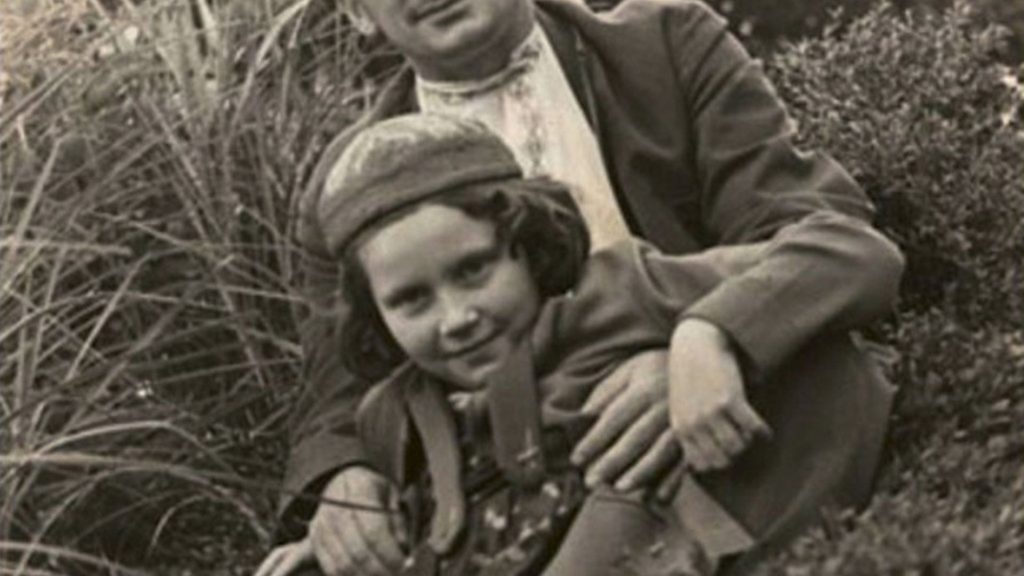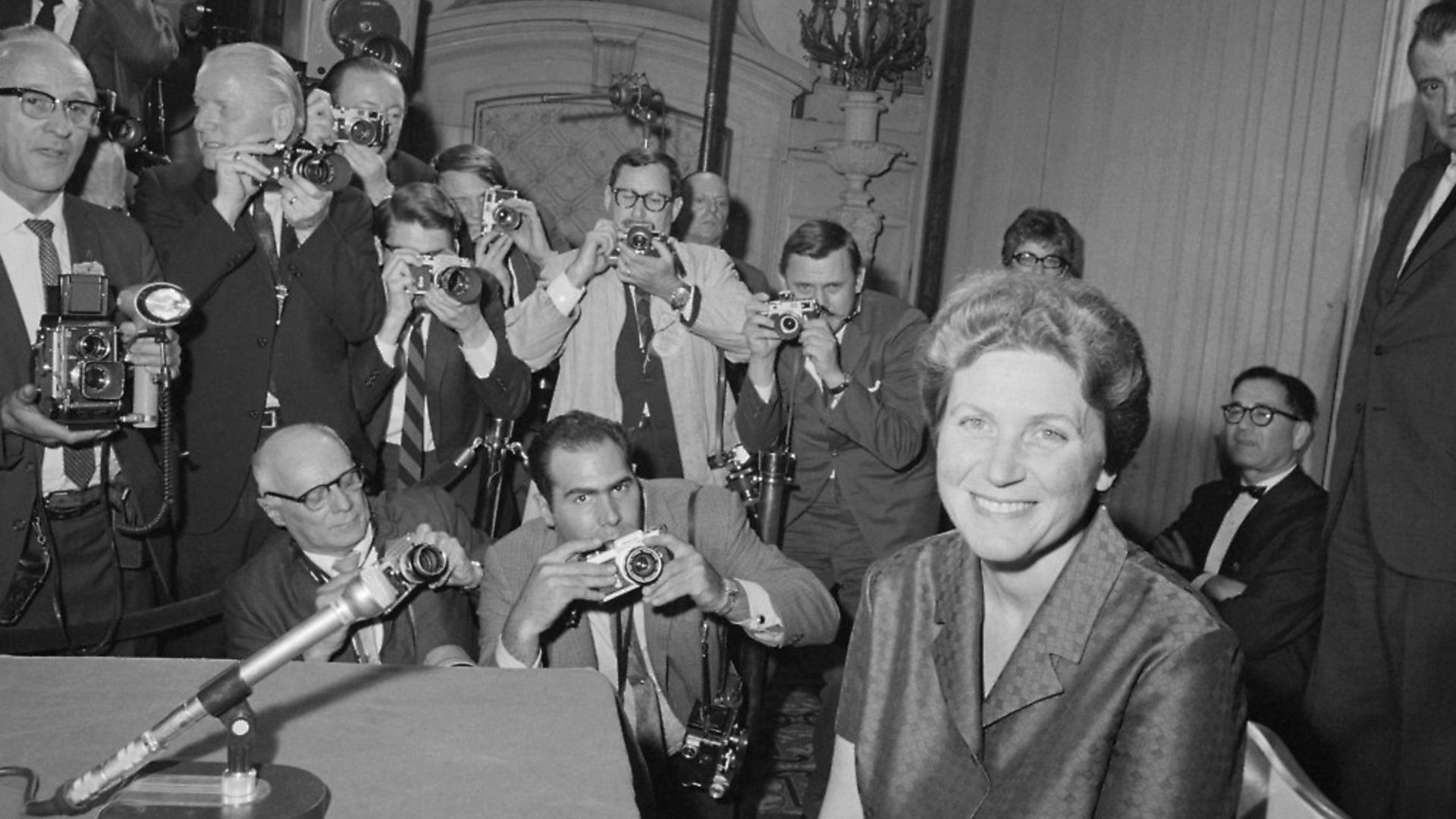CHARLIE CONNELLY looks back on the life of Svetlana Alliluyeva.

On the afternoon of Friday April 21, 1967, a Swissair jet from Geneva taxied to a halt on the apron at John F. Kennedy airport in New York. When the door opened a woman in a white jacket skipped lightly down the steps, hurried across the tarmac, stood at a lectern behind a thicket of microphones, looked out at the sea of raincoats and trilbies gathered in front of her and smiled broadly. Svetlana Alliluyeva was going to savour this moment.
Once notebooks had been opened and pencil stubs licked she dipped her head slightly towards the microphones and said, “Hello there, everybody”.
She was 41 years old and in that moment felt for the first time that she was in control of her life and her destiny.
Despite the huge amount of attention paid to her arrival in the US, Alliluyeva was not a pop star or screen idol. Indeed, most of the press pack gathered in front of her would have been hard pressed even to spell her name correctly and were certainly not there to quiz her on her work as a literary translator or to ask who designed her outfit.
Indeed it wasn’t Alliluyiva herself that the media were interested in at all. The gathered reporters were not, as far as they were concerned, even looking at Svetlana Alliluyeva, the middle-aged woman with neat auburn hair and a wide smile, what they were looking at was Stalin’s daughter, who six weeks earlier had walked into the US embassy in New Delhi and defected. It was the defection, not the woman, that was the story here.
In the 1960s the Soviet Union was an unnerving mystery to most people living outside it and Stalin, details of whose atrocities had emerged after his death in 1953, was still a terrifying figure more myth than man. When Alliluyeva had walked into the embassy and told them who she was, the diplomat sent out to speak to her responded incredulously, “You… you mean the Stalin?” Officials were initially doubtful: While she had appeared as a young girl in photographs with her father the US had no record of her existence after that, certainly since she had changed her name from Svetlana Stalina to take her mother’s name of Alliluyeva. It was as if she had arrived from outer space.
When she addressed reporters that spring day in New York the television cameras and photographers’ lenses probed her features for any resemblance to her father and reporters listened for a trace of the iron will and fearsome rhetoric they were sure must be present in her genes. Instead they heard a cheery voice speaking perfect English as Alliluyeva detailed how “there are no capitalists and communists for me, just good people and bad, honest and dishonest, and in whatever country they live people are the same everywhere”.
“I hope,” she added, “to find freedom of expression in America that will allow me to write, study and make some small contribution to the world of arts and letters.”
She’d been in India to scatter the ashes of her lover Kunwar Brajesh Singh, an Indian communist she’d met in 1963 when he was visiting Moscow. The couple fell in love but were forbidden by Soviet authorities to marry, and when Brajesh Singh died in 1966 of a bronchial complaint Alliluyeva had to lobby hard for permission to sprinkle his cremated remains on the Ganges.
Once the stunned embassy officials had confirmed her identity the Americans flew Alliluyeva out of India on the first available flight, to Rome, from where she was moved to neutral Switzerland until her transfer to New York could be completed.
One thing the press gathered at JFK would not have known was that as she made herself comfortable at the US embassy her two children, Iosif, 22, and 17-year-old Yekaterina, were waiting unawares at Moscow airport expecting their mother’s return from India. Three days later she wrote to tell them that she had to leave because Soviet communism had been a failure.
“Please, keep peace in your hearts,” she said, urging them to make the best they could of their lives in which she would no longer play a part. “I am only doing what my conscience orders me to.”
Her children never forgave her, but it’s perhaps no surprise that Alliluyeva could make questionable decisions as a parent. She’d lost her mother at six years old, to peritonitis so she was told, only finding out by chance a decade later that Nadya Alliluyeva, Stalin’s second wife, had in fact shot herself through the heart. It was only then that she began to suspect the truth about her father, a man who had been a warm and doting parent until his daughter had learned of her mother’s suicide. Other things began to make sense – the sudden disappearances of aunts and uncles on her mother’s side, for example, who were prone to reminiscing about their sister.
At 17, still coming to terms with the truth, she fell in love with a Jewish filmmaker named Aleksei Kapler. When Stalin learned of the relationship he had Kapler sent to the Gulag for a decade, physically beating his daughter when she protested. A year later she met another Jewish man, a fellow student at the Moscow State University named Grigory Morozov, whom she informed her father she wished to marry. Stalin slapped her face and refused to meet “your Jew”. Despite this the couple married in 1945 and had a son, Iosif, but divorced in 1947. There was another brief marriage to the son of Stalin’s deputy Andrei Zhdanov, from which Yekaterina was born. These short-lived unions that suggested the looming, malevolent presence of her psychopathic father – in 1952 Nikita Khrushchev had watched Stalin grab his daughter by the hair at a party and force her to dance before a gathering of dignitaries – would always be the dominant male figure in her life.
Once settled in the US she published her autobiography, Twenty Letters to a Friend, which earned her $2.5 million, much of which she gave away to charities. She burnt her Soviet passport and married an architect named William Peters, taking the name Lana Peters and having another daughter, Olga, before that marriage too ended after three years.
A follow-up to her memoir that detailed the events around and immediately after her defection had sold well, but once the novelty of her arrival in the US had worn off Alliluyeva found it all but impossible to make a living through writing. She also admitted to feeling increasingly lonely. Then, in 1984, she received what she interpreted as a reconciliatory telephone call from Iosif.
When he was refused permission to travel to see her, almost on a whim she packed up her belongings, flew to Moscow with the now 13-year-old Olga and begged Soviet officials to allow her to return.
“For this desperate woman,” said Time magazine, “the prospect of seeing Iosif appeared to herald a new beginning.”
On arrival Alliluyeva denounced her American life. She had not seen “one single day of freedom”, she said, and had been nothing more than a puppet of the CIA. When an American news correspondent attempted to ask a question at her first press conference she cut him off, yelling, “You are savages! Uncivilised people!”
After 18 months in the Soviet Union, during which her relationship with Iosif and Yekaterina deteriorated irreconcilably and she lived for a while in her father’s home territory of Georgia, Alliluyeva was back in the US explaining away her anti-American comments as a misunderstanding in translation.
She moved regularly after that, at least once a year. Olga later recalled that they always had to be in a new location by November which, her daughter realised, was the anniversary of the death of Svetlana’s mother. Rumours abounded; she was living in a shack in Wisconsin with no electricity or running water, she was in a Catholic convent in Switzerland, she was living in a run-down old people’s home in Shepherd’s Bush, but when she died in 2011 it was in a Wisconsin care home, alone. Iosif was dead, Olga was living in Portland, Oregon, and Yekaterina was working as a geologist on the Kamchatka peninsula, both daughters making lives a long way from their mother.
She was often irascible, demanding, prone to rages and could be cruel to loyal friends and family members, but at the heart of it all Svetlana Alliluyeva was a lonely woman whose place in the world, whatever she did, was always destined to be defined by her father. On the New York airport tarmac that afternoon in 1967 she saw an opportunity for a fresh start, a chance to emerge from his shadow and forge a destiny of her own. It didn’t happen. “You can’t regret your fate,” she once said, “although I do regret my mother didn’t marry a carpenter.”










